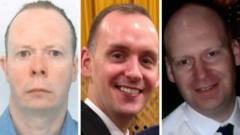1 hour ago
About sharing
The deaths of three men murdered by a man convicted under anti-terror laws in a Reading park were avoidable, an inquest has concluded.
Khairi Saadallah killed James Furlong, David Wails, and Joe Ritchie-Bennett, in Forbury Gardens in June 2020.
He was given a whole-life term in 2021 after admitting murder and the attempted murder of three other men.
Judge Coroner Sir Adrian Fulford found major problems with intelligence sharing between authorities.
Addressing the court, he described Saadallah’s “volatility” and said he had a “terrorist mindset”.
Counter Terrorism Policing, the Probation Service and Berkshire NHS Foundation Trust were among the organisations criticised for failing in the case.
Speaking outside the Old Bailey, James Furlong’s father Gary said: “Our boys didn’t stand a chance.”
“It is clear that there was failure after failure by all state agencies who dealt with Saadallah,” he said.
Saadallah arrived in the UK in 2012 as a teenage refugee, having fought in the Libyan revolution, and suffered from PTSD, among other conditions.
He had extensive contact with mental health services, but Sir Adrian said Saadallah was “caught in a catch-22” with no continuity of care.
He concluded it was “at least possible” Saadallah would never have attacked the men if his mental health had been correctly managed by authorities.
Sir Adrian also said if intelligence about the high risk he posed had been shared properly he might have been detained by police.
He also found “significantly troubling failings” by counter-terrorist police officers, who lacked understanding and did not share information with other forces and the probation service.
Counter-terror programmes, such as Prevent, did not provide any “effective intervention” to address Saadallah’s threats.
Reports about the risk he posed were “markedly deficient”, the judge coroner said, and one intelligence assessment was “simply inadequate”.
Sir Adrian said Saadallah had “demonstrated capacity for violence” on many occasions, and his behaviour had “markedly deteriorated” in the 18 months before the attack.
He should have been recognised as a high-risk patient, he added.
Saadallah was released from prison on 5 June 2020 and went to live in a flat in Basingstoke Road in Reading before he started preparing the attack.
He visited Forbury Gardens, researched it online and bought a knife in a Morrisons supermarket.
CCTV cameras captured Khairi Saadallah before and after the stabbing
The night before the murders, local officers visited Saadallah after his brother rang police to raise concerns about his mental state.
Body-worn video from the two-minute encounter shows Saadallah reassuring the officers, who asked how he was feeling and if he had enough food.
A carrier bag containing a knife was visible on the floor behind him.
On 20 June, his attack was “ruthless and lethal”, prosecutors at his murder trial said. He attacked his victims so quickly that those who died had no idea what was happening.
He shouted “Allahu Akbar [God is greatest]” as he attacked, and again as he ran away into Reading town centre, where he was chased and arrested by unarmed police.
When he was sentenced in January 2021, Judge Mr Justice Sweeney said Saadallah carried out a “ruthless and brutal” attack.
He said the three men “had no chance to react, let alone defend themselves”.
The judge added he was sure the attack “involved a substantial degree of premeditation or planning” and was carried out “for the purpose of advancing a political, religious, or ideological cause”.
Speaking outside court, Dr David Wails’ brother Andrew said: “The failings of the state exposed by this inquest sicken and disgust me, those who failed in their duties are responsible for David, James and Joe’s deaths.
“I will never forgive and never forget the pain and suffering inflicted on David and my family, which we have to endure for the rest of our lives.”
A spokesperson for Berkshire Healthcare NHS Foundation Trust said there had been “significant learnings” in the trust since the Forbury Gardens attack.
They said changes were “focussed on much better communication and engagement with our partners and the way in which multi-agency working is delivered.”
“We will now review the coroner’s findings and work alongside all agencies involved, to ensure any further learning and improvements can be agreed and embedded as quickly as possible,” they added.
Speaking on behalf of Counter Terrorism Policing South East and Thames Valley Police, Assistant Chief Constable Tim Metcalfe said they acknowledged the inquest’s conclusion.
He said: “We in policing have not waited until this point to make changes where needed.
“Much has already been done to address these issues, but let me be clear, I know that there is still work to do.”
He said police had an “unrelenting” commitment to learn, change and improve “where required”.
Follow BBC South on Facebook, X, or Instagram. Send your story ideas to south.newsonline@bbc.co.uk or via WhatsApp on 0808 100 2240
19 February
14 February
24 January
23 January
5 June 2023
11 January 2021
